When we think about the state of Trust in in mid-2022, there is some good news: Trust is rising (at least in democratic countries, while falling in autocratic ones).
The bad news: the gap in Trust has dramatically widened between higher-income people compared with those earning lower-incomes, globally.
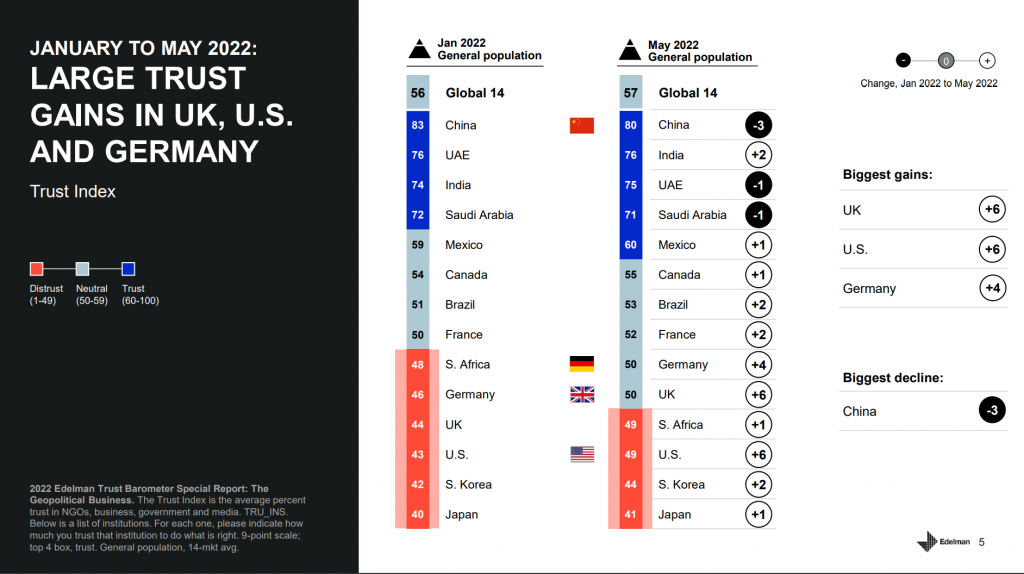
And that gap is “tinder” that can be quickly sparked into a socio-political fire in countries around the world, Richard Edelman cautioned today when introducing the latest look at the 2022 Edelman Trust Barometer, focusing on geopolitics and business.
We have never seen numbers like this before, Edelman noted after over two decades conducting this research.
He explained: the bottom quarter of people see inflation, concerns about job loss, and outcomes from the pandemic who have never quite recovered. worse outcomes from the pandemic from which some have never recovered. “The trust gap between the highest quartile and the bottom has never been larger,” Edelman said. “We have never seen numbers like this before.”
Edelman further warned: “This is the tinder on the floor of the world situation that, with one spark, is populism and yellow vests and more.”
The Edelman Trust Barometer is a perennial feature providing context at The World Economic Forum every year. This week, the meeting convenes live in Davos, for the first time since before the emergence of the coronavirus pandemic. Leaders in government, business, media, and NGOs will be discussing the converging big issues of the moment: Ukraine/Russia, climate change, inflation, food supply, and to be sure, public health — with new concerns about monkey pox on the pandemic radar.
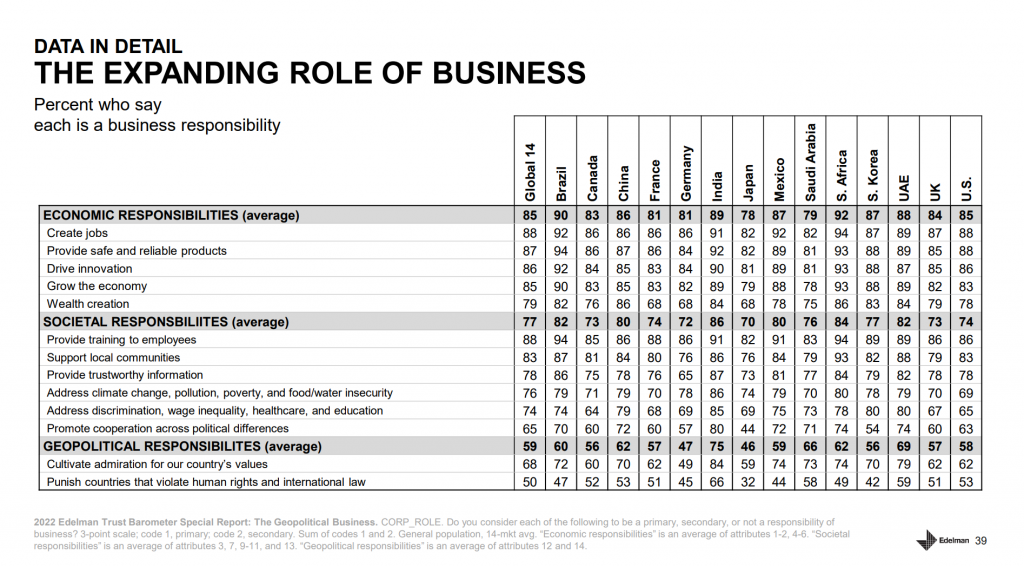
It’s the business sector that continues to be most-trusted by people for its competence and ethics. “That’s why we keep getting assigned these tasks,” Edelman said. But a caveat on that is that, “You can’t juggle the 3 balls equally in a recession[ary] environment.”
For over a decade, CEOs have had two mission-balls to juggle in leading their companies: economic responsibilities (such as job creation, ensuring safety in products and services, and driving innovation) and societal (such as supporting local communities, addressing climate change, and providing trustworthy information).
The Ukraine Invasion by Russia has added a third ball to CEOs juggling act: geopolitical responsibilities.
“CEOs who have been juggling financial and economic performance with societal impact now have a third, geopolitical, ball to keep in the air,” Edelman advised.
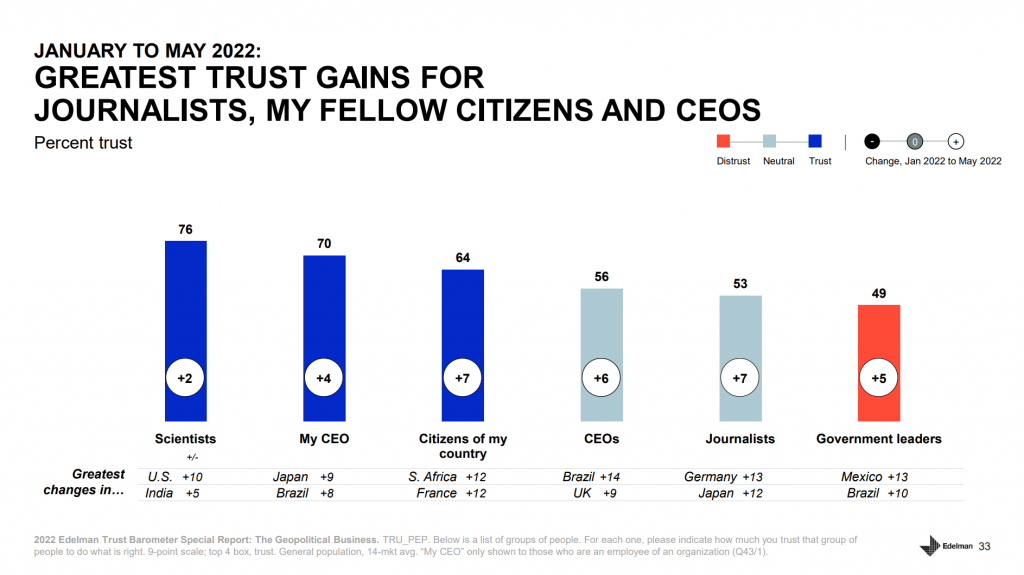
While government got a nudge up the Trust Barometer in 2020 at the start of the pandemic, business has held its leading edge in trust equity with global citizens in 2022.
See that scientists gained 10 trust-points in the first half of 2022 in the U.S. To that point, one of business’s strongest trust-points is companies’ ability and power to deliver facts and sound information to their publics.
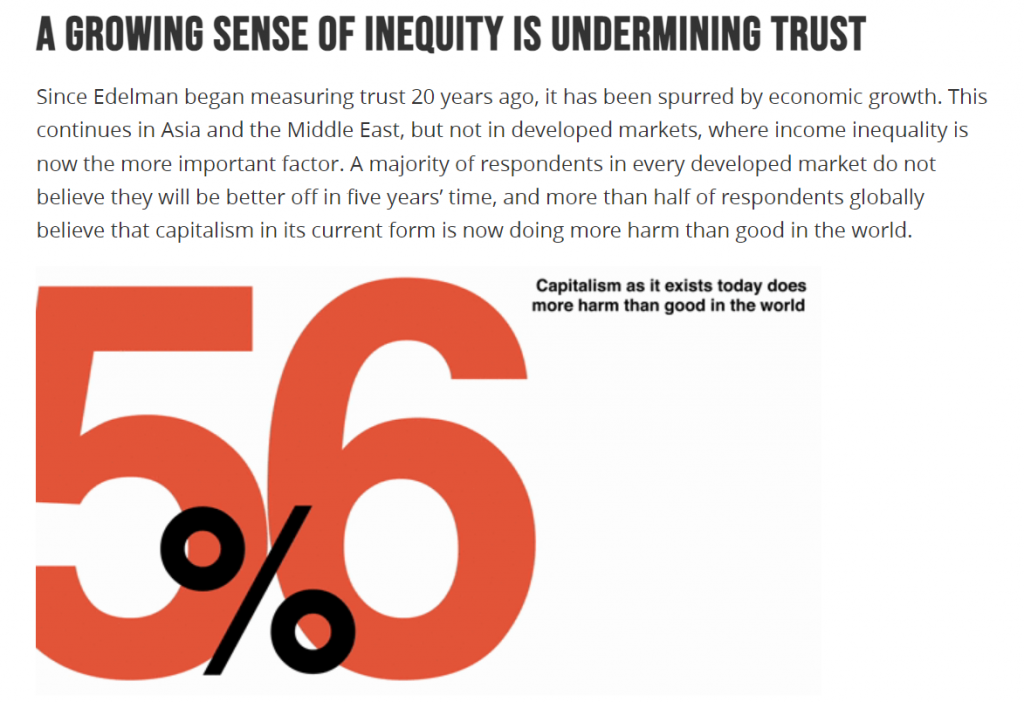
Dr. David Nabarro was one of several panel commentators, adding his lens as Special Envoy on COVID-19 to the World Health Organization.
As a public health doctor, he zeroed in on inflation, and specifically food and energy costs, contributing to some peoples’ trust deficits.
“The trust gulf has widened enormously,” Dr. Nabarro said. COVID has “hurt people all over the world really hard….We are trying to start to understand the fracturing of social relationships due to COVID,” which has severely impacted 20% of the poor world citizens he commented.
“In September 2021, we started to notice all over the world that food prices started to go up due to energy going up too…the fertilizer prices were going up and then alarm bells were ringing,” for him and his colleagues in and beyond WHO.
“The world can’t tolerate a situation where poor people are disenfranchised to keep economies going,” he cautioned.
I included this graphic with the big red “56%” from the 2020 Edelman Trust Barometer which called out that growing sense of inequity undermining trust. This is what Dr. Nabarro warned about from his read of the 2022 Trust Barometer and what he’s observing on the ground, globally, in the aftermath of the coronavirus pandemic and converging stressors of inflation, food supply, and social alienation.
“Having had a bad COVID, we’re having a much worse cost of living crisis,” he said, calculating that 94 countries are threatened by this with the prospect of severe hunger or famine,” That equates to some 1.7 bn people living in countries facing these risks.
“COVID started it. Climate change exacerbated [the challenge]. Conflicts are worsening it….Can we not notice it while it’s happening and work together?” he asked us.
After a provocative and informative panel discussion, Richard Edelman concluded the session that, convened at 730 am CES time zone, kicked off today’s WEF sessions: “The mass class divide is corrosive and scary, and we have to do everything we can about food, energy and health because that is the litmus test whether business is seen as a quality participant in our society.”
Edelman polled 14,000 people in 14 countries in April and May 2022 for this round of the Trust Barometer.
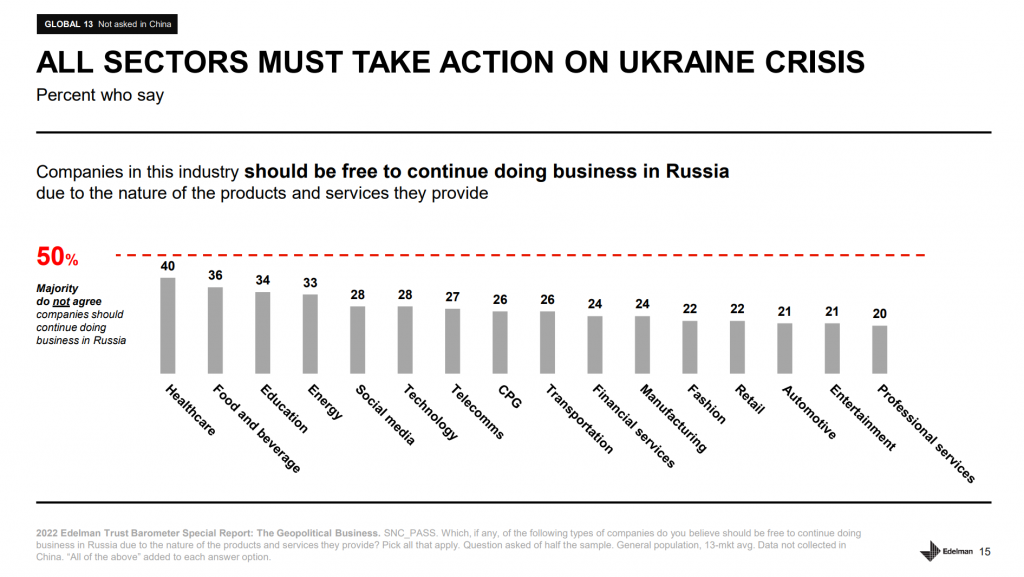
Health Populi’s Hot Points: Public-private partnerships are key to building new, sustainable systems that underpin the future of global health.
The COVID-19 era accelerated adoption of the business mantra that “every company is now a health care company.”
Thinking with our health-hats on, we note in this last bar graph that globally, most people do NOT agree that companies should continue doing business in Russia — and that goes for pharma, healthcare, and food businesses, among others.
“No pass is given for pharma or food,” Richard Edelman made clear from the survey data.
Rana Foroohar wrote in today’s Financial Times, “The economist Dani Rodrik has pointed out, for every $1 of efficiency gain from trade, there is typically $50 worth of redistribution towards the rich. The economic and political consequences of that are the key reason that we are now in a period of de-globalisation.”
This underpins the Edelman observation that “national brands” are on the upswing among each nation’s citizens with a huge gap between trust in “brands in my country” and “foreign brands.”
This ethos erodes our sense of public health and community responsibility: what happened in Wuhan didn’t stay in Wuhan, and we are our brothers’ and sisters’ keepers when it comes to battling epidemics.
As Dr. Nabarro. a lifelong public health doctor, shared today, “One thing I’ve always known as public health doctor is if you want to help people keep free of disease, it has to be a partnership between authorities and people – if it becomes adversarial it becomes difficult,” he warned.
“It’s not charity….it’s the future of the world.”
Edelman asks the question, “why do we study trust?”
They answer: “Trust is the ultimate currency in the relationship that all institutions build with their stakeholders.”
In no other sector is that ultimate currency more impactful than in health.


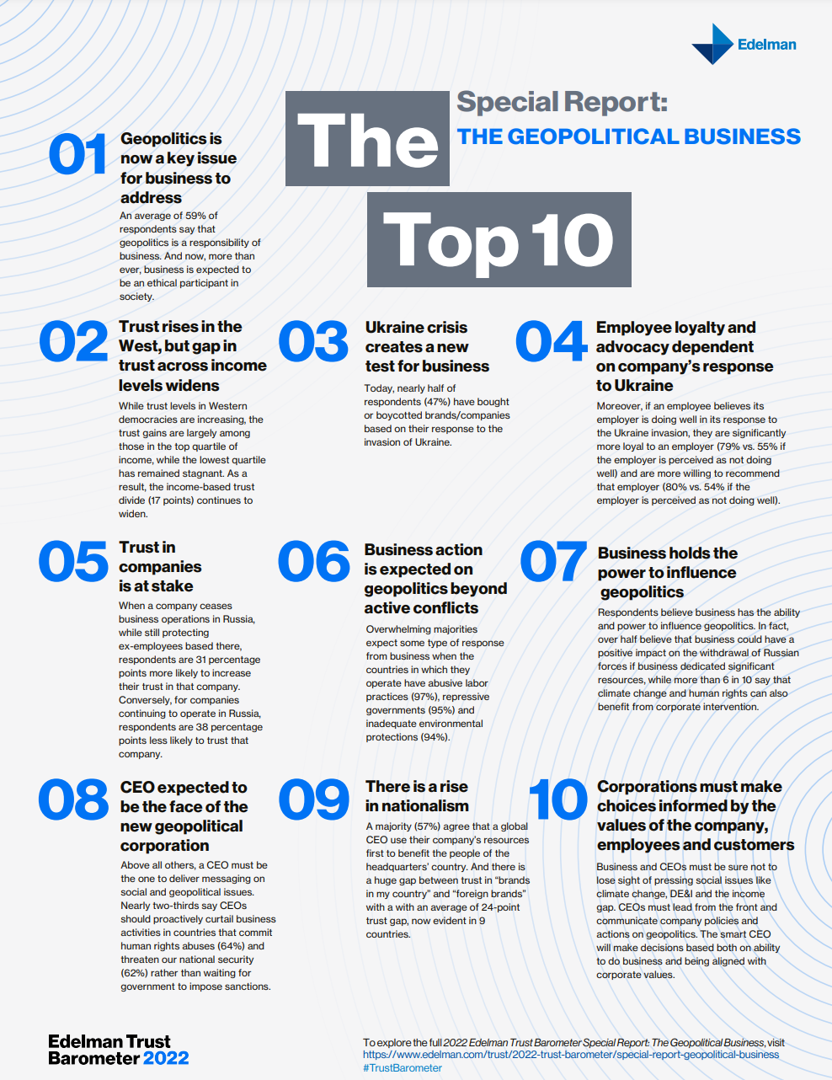


 Interviewed live on BNN Bloomberg (Canada) on the market for GLP-1 drugs for weight loss and their impact on both the health care system and consumer goods and services -- notably, food, nutrition, retail health, gyms, and other sectors.
Interviewed live on BNN Bloomberg (Canada) on the market for GLP-1 drugs for weight loss and their impact on both the health care system and consumer goods and services -- notably, food, nutrition, retail health, gyms, and other sectors. Thank you, Feedspot, for
Thank you, Feedspot, for  As you may know, I have been splitting work- and living-time between the U.S. and the E.U., most recently living in and working from Brussels. In the month of September 2024, I'll be splitting time between London and other parts of the U.K., and Italy where I'll be working with clients on consumer health, self-care and home care focused on food-as-medicine, digital health, business and scenario planning for the future...
As you may know, I have been splitting work- and living-time between the U.S. and the E.U., most recently living in and working from Brussels. In the month of September 2024, I'll be splitting time between London and other parts of the U.K., and Italy where I'll be working with clients on consumer health, self-care and home care focused on food-as-medicine, digital health, business and scenario planning for the future...